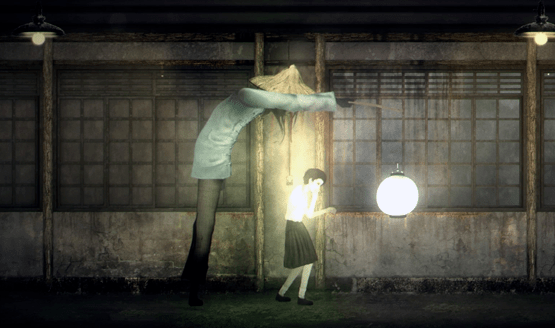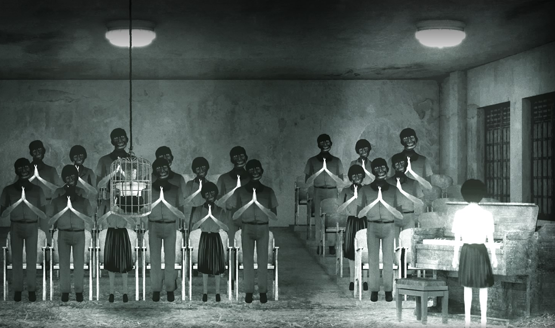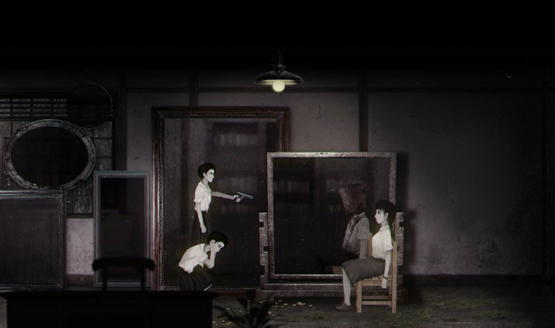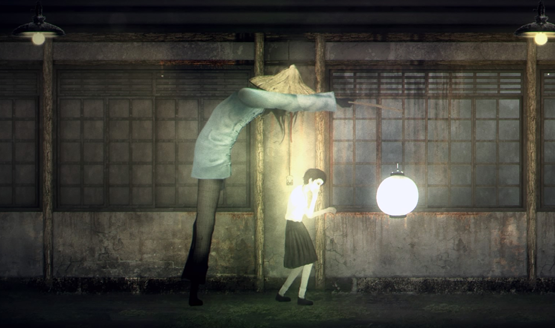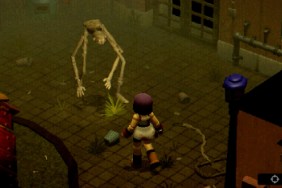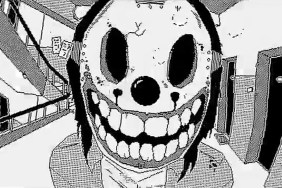You can’t run. You can’t fight. Your only choice is to hold your breath as they slink eerily by, and then face the horror of your inner demons. Detention is a mix of the familiar–take elements of Silent Hill, side-scrolling point-and-clicks, and Asian horror–with a final product that is wholly unique. Taiwanese developer Red Candles dug into the actual history of their country to bring a psychologically impactful tale set in the 1960s and exploring the horrors of militant governmental control during the period of time known as the White Terror.
I knew very little of this period of time in Taiwan’s history before playing Detention, but it managed to provide enough context to make sense. At the same time, the entire experience never feels like a bunch of historical exposition. When blended with some of the horrific elements and imagery, the right balance of dealing with something deeply personal to the main character is met with a good understanding of why these issues are so heavy.
The White Terror was a period of martial law in Taiwan that lasted from 1949 to 1987. The Chinese Nationalist Party imprisoned more than 140,000 of Taiwan’s social elite and intellectuals out of a fear that they would try to resist the leadership or sympathize with communist ideals. More than 3,000 of them were executed. The knowledge that something like this actually happened to people makes the tragedy of Detention’s more personal story much more palpable. Someone in Taiwan is very likely living with the very horrors that Detention deals with.
Origins of Horror
It all begins in a school. Having fallen asleep at his desk, Wei wakes up alone. The school is abandoned, and some weird things are happening. It’s not long before he meets a girl who is also trapped in this nightmare, and together they must navigate the horrors and figure out why this is happening. Most of Detention is a series of point-and-click puzzles, meaning you’ll be bringing one object to a different place, to unlock somewhere else for a different object to go, and so on. It has all the trappings of a traditional Silent Hill or Resident Evil type of experience, at least on the puzzle side of things.
There are a couple of puzzles that lean on the intellectual side, actually requiring the player to figure something out rather than just shift objects around, but with the relatively short three hour runtime, Detention doesn’t really take the opportunity to explore tougher puzzle mechanics. It doesn’t explore combat either. Often the way forward will be blocked by horrific ghouls, and the only way through is to hold your breath. It’s a brilliant bit of game design for a horror game, being neither fight or flight, and I often found that I was actually holding my own breath during these moments.
That’s the kind of horror that permeates Detention’s haunted school. It’s a horror of bated breath and waiting. It’s a psychological unease pinned up by eerie sound design and uncanny visuals. I could never decide if they were beautiful or horrifying. I scoffed at the claim that a side-scrolling game could bring legitimate horror, and then was brought to the darkest depths of apprehension. It’s hard to describe what I felt as full on fear or horror, but a creeping sense of disquiet made its presence ever known. Bizarre imagery was consistently punctuated by piercing soundscapes in an effort to inject Detention’s particular brand of horror deep into the psyche of the player. It might not be the kind of horror game that I’m used to, but when something sits and digs at your gut the way this game scratched at mine, you might want to pay attention.
Depths of Tragedy
Though the story of personal hell in a time of militant law is an interesting one, I did feel that the storytelling was off balance. The first two-thirds of the game are full of subtlety and horror before the final act drops you off a cliff of exposition, shirking much of the horror mystery in favor of placing a psychological and emotional heaviness on the reality of the situation. In addition, there are two endings. The “bad” ending has a much darker emotional weight, but misses some storytelling elements, while the good ending brightens the bulb a small bit and reveals more about the nightmare. It’s unfortunate that this isn’t better communicated in game. I got the bad ending first, and while I love stories that end in depressing tragedy, I had to hop online to realize that the trophy I missed was from the other ending (which is still quite depressing, given the nature of the story).
It’s then quite jarring to go from navigating the simple maze of the school and solving the various puzzles thrown at you, to a much more straightforward journey that amounts to little more than pushing the analog stick in the right direction. The dread that I felt throughout the game didn’t go away, but it shifted quite drastically from a sense of fear due to the environment to a sense of fear due to the details of the story, and realizing exactly what kind of nightmare this all was. While the payoff is morbidly satisfying–regardless of which ending you get–I couldn’t help but feel that Detention dropped the atmospheric horror a little too early and let the final act drag on a bit too long.
Detention has something to say. It has something to say about the sweeping themes of militant government regimes. It has something to say about each one of our personal hells and the journey towards even the smallest bit of redemption. It has something to say but it never shouts. It slides its message in silently like a blade into your gut. Even with some of the miscues in storytelling, Detention never lets up on making sure that players feel uneasy and uncomfortable, pressing you until that final twist of the knife. It’s not a difficult game. It’s not a long game. But it’s a game that will stick with you well after the credits have rolled.
Detention review code provided by publisher. Version 1.01 reviewed on a standard PS4. For more information on review scores, please read our Review Policy.
-
Atmospheric and psychological horror through disturbing audio and visuals
-
Uses real history to tell a personal depressing tragedy
-
Blend of Silent Hill, Asian horror, and point-and-clicks
-
Pacing near the end shifts from horror to exposition
-
Brief experience that could explore more of its horror and puzzles
